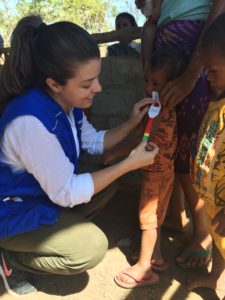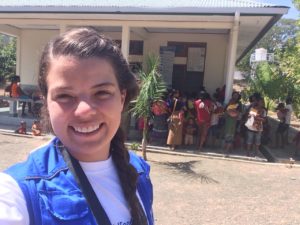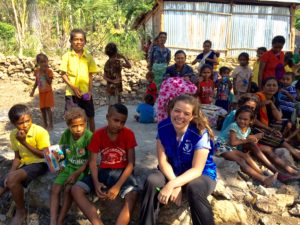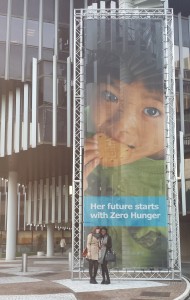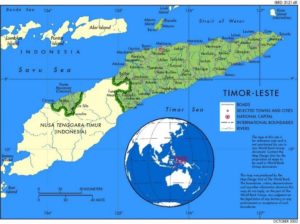
Camila Urbina is a joint MPA/MAIR student who secured her internship at WFP by writing directly to country offices and looking outside well known locations. For her Fall 2016 Semester, she plans to study at Sciences Po in Paris through one of SU’s World Partner Programs.
Amongst the amazing opportunities the Maxwell School has provided me during my joint degree, this summer was certainly the most life-changing. I could have never imagined the incredible professional and personal experiences and growth that awaited me while working for the World Food Programme (WFP) in Timor-Leste.
Timor-Leste is one of the newest countries in the world, the proud and resilient Timorese gained their independence from Indonesia after a terrifying war only 16 years ago. With one million inhabitants and a young government, Timor is navigating post-conflict, much like my native Colombia, with the help of the UN.
The country has the world’s worst stunting in the world and some of the worst malnutrition numbers in Asia; this is why the World Food Programme is supporting the Timorese Ministry of Heath to conduct a mother and child nutrition programme. The programme provides nutrition screenings, education and supplementary foods for pregnant and lactating mothers and malnourished children under two years old in 6 of the most critically malnourish municipalities in the island nation. WFP is also providing technical assistance and capacity building to the Timorese so that they may eventually take full control of the program.
My three months were divided into working in the main office in the capital Dili, supporting the monitoring and evaluation department, and working in the field, providing food and nutrition education for the country’s most remote and malnourished communities in the mountains of enclave province of Oecusse.
The WFP country office in Timor is aiming at creating a social accountability mechanism to include in their nutrition program. During my time in Dili, I was tasked with creating a benchmark of the mechanisms and strategies used by those other UN agencies and NGOs in Timor to get feedback from communities and help put together a proposal to create the country office’s own social accountability system. Furthermore I was in charge of creating a gender action plan for the office, based on the guidelines provided by WFP headquarters in Rome, in order to help materialize WFP’s commitment to women empowerment and gender balance in all aspect of their work. I also supported various communication needs, writing stories, interviews and particularly covering the work in the field during international Breastfeeding week.
It was a profoundly enriching experience to be a part of the country’s learning process in matters of nutrition and social resilience and to experience not only the challenge of working with government in a different culture but more importantly the joy of serving in the remote and beautiful villages. This summer was an incredible experience, serving the resilient and loving Timorese and living amongst the wild and the unbridled beauty of their island-home has provided me with new perspectives on humanitarian work and given me the opportunity to practice all the theory provided by the Maxwell School to the benefit of the most vulnerable.
